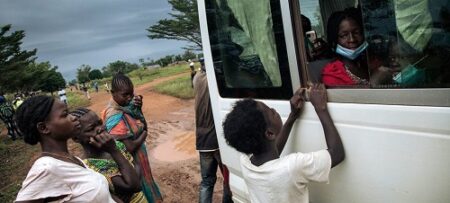Yaounde Declaration Provides Succour For 1.4 Million Central African Republic Refugees
Countries neighbouring the Central African Republic have been asked to help the 1.4 million refugees from the country displaced by armed conflicts in the country and are scattered across the region.

Countries neighbouring the Central African Republic have been asked to help the 1.4 million refugees from the country displaced by armed conflicts in the country and are scattered across the region.
The call is contained in a declaration made in Yaounde, the capital of Cameroon, on Wednesday, April 27 at the end of a regional conference organised by the government of Cameroon and the United Nations High Commission for Refugees (UNHCR).
Speaking during the conference, Filippo Grandi, the UN High Commissioner for Refugees, revealed that the conference was intended “to create a positive dynamic at regional level in the search for solutions to the benefit of Central African Republic refugees.”
“This effort must be carried out within the context of a large alliance comprising governments, humanitarians, enterprises, development actors, civil society, the private sector and imperatively, the refugees themselves, in particular the women,” Grandi said.
The Yaounde Declaration marked the first step towards the establishment of a regional coordination mechanism to find solutions to one of the most important crises in Africa in terms of forced displacement of persons.
Since 2013, the Central African Republic has been the theatre of successive crises affecting six neighbouring countries that currently house 700,000 refugees from the Central African Republic.
Cameroon has given refuge to the largest number of these refugees who number 345,000, followed by DR Congo which has welcomed 212,000, with Chad housing 119,000, the Republic of Congo (Brazzaville) hosts 29,000 Central African Republic refugees while Sudan hosts 28,000, and South Sudan 2,500.
Addressing the challenges Cameroon faces by harbouring such a large number of Central African Republic refugees, Cameroon’s Prime Minister and Head of Government, Dion Ngute, said “it is necessary to combine efforts within the context of a regional approach to define the global and concerted solutions in order to obtain the best results.”
The signatories to the Yaounde Declaration agreed “to establish a regional cooperation context with the support of the international community, in order to reinforce the protection and the search for solutions to the benefit of persons uprooted by the crises in the Central African Republic.”
They also reaffirmed their engagement to “support the ongoing reconciliation process in the Central African Republic and to encourage the uprooted persons and those repatriated to actively participate” in both concerning the peace accord signed in 2019 and the recommendations envisaged by the Republican Dialogue of March 2022 in which the refugees and internally displaced persons participated.
Represented by ministers and senior government officials, the host countries agreed to increase the protection of refugees and promote their socio-economic inclusion while waiting for the amelioration of conditions before they return to their country.
The refugees on their part want to be considered as facilitators of development and not as burdens and solutions arrived at during the conference including the lifting of judicial obstacles to employment opportunities and training as well as access to social services.
Signatories to the Yaounde Declaration agreed to integrate the refugees into the national registration systems in order to “facilitate the deliverance of civil status documents and to ensure their recognition by the public and private services as well as financial institutions.”
In spite of all the challenges, Central African Republic refugees have been returning to their country from the various neighbouring countries.
More than 100,000 of them have already returned to their country, and between 2017 and 2021, the UN High Commission for Refugees has facilitated the voluntary repatriation of 27,000 refugees.
In addition, more than 60,000 internally displaced persons have returned to their homes.
However, since most of these efforts were carried out in isolation, the Yaounde conference agreed to establish a coordination mechanism for solutions with the support of the UNHCR which has put in place three regional instruments namely for the Afghan crisis, in Central America and in Mexico as well as in the East and the Horn of Africa.
The Central African Republic Minister of Humanitarian Action, Virginie Baikoua, thanked partners for their support and assured them of the determination of her country to re-establish peace and stability.
The conference brought together 300 participants representing international lenders, the United Nations, the European Union, the Economic Community of Central African States, partners in the development and humanitarian assistance sectors, the private sector as well as the refugees.
Before taking part in the conference, the UNHCR Director General, Grandi, held talks in Yaounde with Central African Republic refugees who saluted the efforts made to find solutions to their situation.
Support Our Journalism
There are millions of ordinary people affected by conflict in Africa whose stories are missing in the mainstream media. HumAngle is determined to tell those challenging and under-reported stories, hoping that the people impacted by these conflicts will find the safety and security they deserve.
To ensure that we continue to provide public service coverage, we have a small favour to ask you. We want you to be part of our journalistic endeavour by contributing a token to us.
Your donation will further promote a robust, free, and independent media.
Donate HereStay Closer To The Stories That Matter




